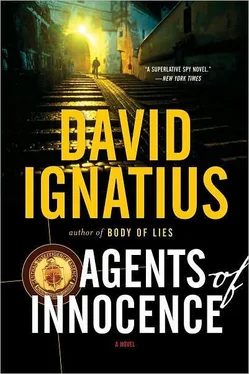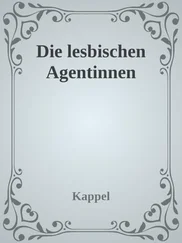David Ignatius - Agents of Innocence
Здесь есть возможность читать онлайн «David Ignatius - Agents of Innocence» весь текст электронной книги совершенно бесплатно (целиком полную версию без сокращений). В некоторых случаях можно слушать аудио, скачать через торрент в формате fb2 и присутствует краткое содержание. Жанр: Шпионский детектив, на английском языке. Описание произведения, (предисловие) а так же отзывы посетителей доступны на портале библиотеки ЛибКат.
- Название:Agents of Innocence
- Автор:
- Жанр:
- Год:неизвестен
- ISBN:нет данных
- Рейтинг книги:3 / 5. Голосов: 1
-
Избранное:Добавить в избранное
- Отзывы:
-
Ваша оценка:
- 60
- 1
- 2
- 3
- 4
- 5
Agents of Innocence: краткое содержание, описание и аннотация
Предлагаем к чтению аннотацию, описание, краткое содержание или предисловие (зависит от того, что написал сам автор книги «Agents of Innocence»). Если вы не нашли необходимую информацию о книге — напишите в комментариях, мы постараемся отыскать её.
Agents of Innocence — читать онлайн бесплатно полную книгу (весь текст) целиком
Ниже представлен текст книги, разбитый по страницам. Система сохранения места последней прочитанной страницы, позволяет с удобством читать онлайн бесплатно книгу «Agents of Innocence», без необходимости каждый раз заново искать на чём Вы остановились. Поставьте закладку, и сможете в любой момент перейти на страницу, на которой закончили чтение.
Интервал:
Закладка:
“Jamal, my friend and brother, we must break out of this cycle! To survive, we must find a way to make our enemies afraid of us. Otherwise we are finished. And that is what I wanted to tell you: That will be our task, you and me. To make our enemies feel the knife of fear.”
The story ended as quietly as it had begun. By now, the room was full of smoke, so dense and thick that the face of Abu Nasir was barely visible. Jamal rose from his couch and silently kissed the older man. Tears were running down his cheeks. For Jamal, that was the night that Black September was born, a mythic organization that had no leaders, no structure, no purpose or plan other than to sustain the intoxicating and deadly specter of terror.
32
Beirut; July 1971
Through the spring and summer of 1971, Jamal was the dog that didn’t bark. He slipped quietly in and out of Beirut, was rarely seen in public, avoided old friends from Fatah, and even altered the conduct of his amorous adventures. As a concession to security, he stopped bringing women home. He went instead to their apartments or hotel rooms or palaces, slept with them once, and then disappeared. He felt virtuous for this modest restraint.
Jamal travelled ceaselessly, relearning languages he had half-forgotten. His passports usually said he was Algerian. They were real Algerian passports, provided by a cooperative member of the Algerian Embassy in Beirut. This particular Algerian could be trusted, Abu Nasir had advised Jamal, because he had never been tortured by the French. That was one of Abu Nasir’s peculiar rules: Never trust a man who has been tortured, regardless of whether he cracked. A victim of torture sees the very worst about the world, in himself and his torturers. He loses something.
Jamal made a plausible Algerian, with his dark black hair and continental manners. He was Chadli bin Yahiya or Omar Sahnoun or Tariq bin Jedid. The names became like new layers of skin, masks on top of masks.
Jamal’s task was to solve a riddle. Abu Nasir had told him to build a solid structure that was invisible, to develop the infrastructure of an organization that would not exist, to plan operations that would appear to have no planning-operations that could be denied plausibly by the very people who had ordered them. It was crucial, said Abu Nasir, that Black September should have no address and leave no footprints. In the aftermath of each bombing or assassination, there should be only the blackness and anonymity of pure terror.
Anonymity meant cut-outs. Layers of people, witting and unwitting, interposed between the word and the deed. It meant establishing dead drops in the major cities of Europe for discreet communications. A boite postale in Paris. A fictitious company in Zurich. A string of flats in London. It meant working with a few trusted Arab intelligence officers, all Soviet-trained, to establish a communications network using embassy codes and the diplomatic pouch.
Building a network meant expanding the frail infrastructure Jamal had been building for many months. It meant recruiting sleeper agents from among the thousands of Palestinian students in Europe. The recruits were kids, most of them, full of hatred for the Israelis and the false courage of youth. Jamal’s spotters would identify the best prospects. A recruiter would meet them, swear them to secrecy, offer them a small stipend, and tell them that in return the Revolution would someday ask for a favor. Then Jamal would test the novitiates. He would send someone to try to worm and wheedle out of them what they had talked about with the recruiter. Those who divulged the secret, or even hinted at it, were dropped immediately from the list. Those who said nothing remained. There were very few who passed the test, and even those few often proved maddeningly indiscreet.
Jamal struggled to create a competent intelligence organization out of this uncertain band of recruits. It was an agonizing and occasionally infuriating process. Jamal would fix a time for a covert meeting in a European capital and hear his agent respond, “Insha’Allah”-If God wills. He would repeat over and over the need for security only to hear one of his men boast to a fellow Arab in a crowded cafe that he was doing “secret work” for the Revolution that he could not discuss. He would ask one of his agents to bring him a detailed diagram of, say, an Israeli-owned oil facility in Rotterdam and receive a messy pencil sketch that might as well have been a map of the Pyramids in Egypt!
Jamal grew sick of Arabs who were tardy, undisciplined, imprecise, easily corrupted, and self-deceiving. That, however, was his raw material, and he was determined to create from it an organization that worked. So he hammered and pushed and prodded. If the Jews could create the powerful state of Israel from the detritus of 1945, he told himself, then it shouldn’t be impossible to transform several dozen Arabs into a reasonably efficient underground network.
Jamal recruited his lieutenants in Europe from among the Palestinian intelligentsia. In Paris, he selected a balding history professor. In London, a prominent businessman. In Madrid, a distinguished professor of physics. In Rome, a long-haired musician. Like Jamal, they were all aristocrats of a sort-at once proud and ashamed of their elite status.
Long before Jamal, Lenin had understood that such people make ideal recruits for a secret organization. They think in abstractions and turn the mundane stuff of politics-land, statehood, the exercise of power-into idealized images. Soon these images become so pure and fine, so embued with romance, that the death of mere mortals seems like nothing if it advances the sacred cause. The Palestinian intellectuals were perfect recruits: hungry for secrets, motivated by the noblest ideals, capable of the most extreme acts of violence.
At safehouses across Europe, Jamal began to assemble his operational files. The schedule of an Arab League meeting planned for Cairo in November; the floor plan of a German factory that built electric motors for the Israeli defense industry; photos of the Jordanian embassies in Paris and Berne; a map showing the route travelled by the Jordanian Ambassador to London on his way to work; airplane schedules and train timetables for a dozen cities in the Middle East and Europe; stacks of false passports and piles of untraceable cash.
As far as the world could see, Fatah was in disarray, still in a period of drift and disorientation after the Jordan debacle. Fatah leaders issued conflicting statements: one day calling for the overthrow of the king, the next day urging reconciliation. There was a search for scapegoats, with the Syrians blaming the Old Man and the Old Man, in turn, blaming a grand conspiracy that included the Jordanians, Americans, and Israelis. Rather than conduct a rigorous critique of his mistakes in Jordan, the Old Man proclaimed that “unity” would solve the PLO’s problems.
It was the silly season. Egypt’s new president announced that 1971 would be “the year of decision”-war or peace-and then did nothing at all. In that same spirit of confusion, the PLO debated in private whether to face reality and accept the existence of Israel and then voted at a PLO congress in Cairo in February 1971 to reject any solution short of the destruction of the “Zionist Entity.”
The Old Man’s outward actions were so clownish and counter-productive that a sensitive analyst might have been suspicious. Was it possible that these public antics were really a sideshow? Was something happening in the shadows? There were tiny fragments of evidence. A hint of a new Fatah underground emerged in May 1971, when the Jordanian government disclosed what it said was a secret PLO plan to assassinate Jordanian officials. But nobody paid much attention. It was too easy to believe that the Old Man was as incompetent as he looked.
Читать дальшеИнтервал:
Закладка:
Похожие книги на «Agents of Innocence»
Представляем Вашему вниманию похожие книги на «Agents of Innocence» списком для выбора. Мы отобрали схожую по названию и смыслу литературу в надежде предоставить читателям больше вариантов отыскать новые, интересные, ещё непрочитанные произведения.
Обсуждение, отзывы о книге «Agents of Innocence» и просто собственные мнения читателей. Оставьте ваши комментарии, напишите, что Вы думаете о произведении, его смысле или главных героях. Укажите что конкретно понравилось, а что нет, и почему Вы так считаете.












